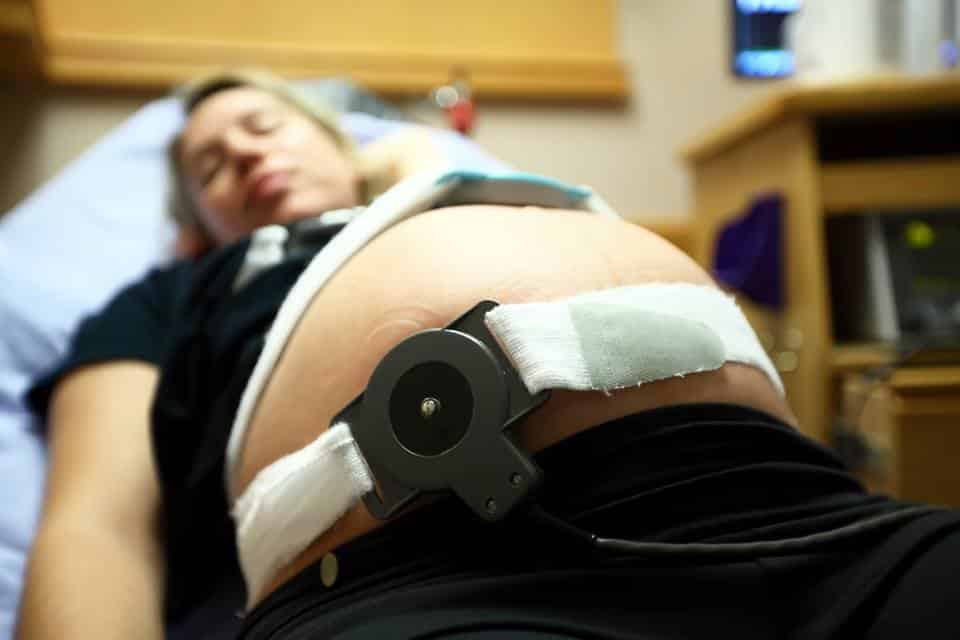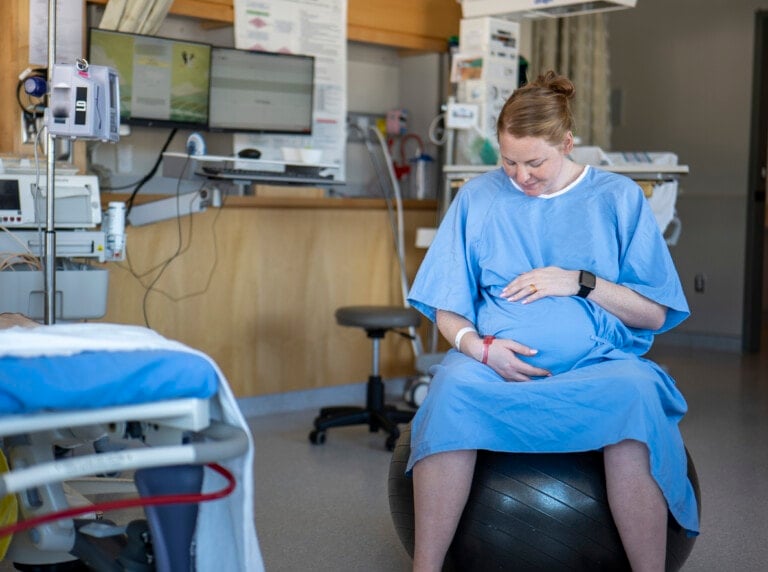I’ve been to many labors and births as a birth doula over the years — over 300, to be exact. And I have seen a lot of things while supporting mothers and their partners. Some things that the support people do are super helpful to the woman in labor, but other things . . . not so much. There are many things not to say or do to a woman in labor.
9 Things to Avoid Doing or Saying to a Woman in Labor
To better prepare support people, I’m sharing some things that people should NOT do or say when visiting or supporting a woman in labor and birth. Most of these points apply to every labor and delivery, but these will especially apply if she wants a natural birth. Hopefully, this will save you from receiving a few death stares or getting yelled at.
1. Over Sharing/Sharing With the World
I know that you are so excited about everything that is going on. You want to tell everyone in the waiting room and probably everyone in the world (or on social media) what’s happening with mom and baby. You must remember, though, that this is her experience, and she may not want specific details shared with other people (even family) at that moment. She may not even want any details shared. Please respect that this is her labor and her birth. She may want to be the one that shares the news. Who knows! Just remember, always ask her before you share any information, no matter how small the details seem.
2. Eating in Front of Her
If she’s not allowed to eat during labor, then (in her mind) you shouldn’t be allowed to either! At least not in front of her. (It’s a terrible idea not to take breaks and eat since you need your energy to support her. The last thing she needs is for you to faint or hurt yourself and become another patient.) However, when it comes to eating, the last thing a woman in labor wants to do is watch you eat your food or smell it. More than likely, she’s starving — especially if she has a long labor. That’s just not nice to eat in front of her. I recommend going to the waiting room or stepping outside if you want to eat.
Also, even if she’s not starving, the smell of food could cause her to become nauseous. I’ve had clients who didn’t like the smell of coffee on their partners’ breath. It was too strong of a scent for them to handle during that time. This is why I also recommend bringing a toothbrush and toothpaste with you or some gum and breath mints.
3. Watching the Monitor the Whole Time
It can be helpful to see when a contraction is coming on the monitor so you can get ready to support her. It is also nice to know when contractions are coming so you can determine mom’s labor pattern. But it is not helpful to a woman in labor if you aren’t paying attention to her because you only watch the screen. This dehumanizes her birth experience and makes her feel unimportant. She wants your help and attention, so don’t constantly look at the monitors.
Also, I don’t recommend commenting about the contractions on the monitor screens and comparing how big or small the contractions are. For example, “That one looks tiny. It shouldn’t hurt you that much. Why are you in that much pain and making that much noise? Woah, that one was HUGE!” NOT helpful! Watch what you say in front of her. Everything should be positive and supportive of the laboring mother.
4. Mindlessly Chatting
I’ve been in labor and delivery rooms where things got loud because many people were talking. Several conversations were happening, and it was as if the guests forgot mom was trying to have a baby. This is not helpful at all! You must be mindful of where you are and respect the laboring mom’s needs. They usually want a quiet, relaxing, and calm room because they are already nervous or anxious about the birth of their baby. Try not to chit-chat too much with the people around you. This can become distracting and irritating to the laboring mama, making her lose her focus in labor. She will let you know if she wants to talk or wants you to talk.
5. Get Upset, Turn Off, or Become Defensive
Labor is hard work. That’s why they call it labor. It can be a long and hard road or a short and hard road. No matter how you have a baby, it is an exhausting mental and physical challenge for every woman to go through. I let support people know there may be a point during labor when mom won’t be as nice as she typically is. She will be tired, hungry, hormonal, and in pain during labor.
Hangry takes on a whole new level when a woman is in labor. If she yells at you, swats you away, curses at you, or cries, do not take anything she says or does personally. It is not about you. It’s the challenge of what she’s going through that makes her break. Because you are invited into that room, you are very near and dear to her heart. You are a safe outlet for her. That’s why she feels she can break down to you. Please don’t turn away from her and become frustrated or defensive because she needs you now. Continue to be helpful and positive. Remind yourself that this is not about you. Think about how much she is going through and has been going through over the past nine months.
6. Deny Pain Medication
Some moms know that they want an epidural during labor. Other moms know they want a natural birth and want to avoid unnecessary interventions. Hopefully, you have discussed her birth plan with her to know what she wants. I’ve had some mothers tell their significant others they absolutely cannot let her get an epidural or pain medication no matter what happens or what she says. While I am a big advocate for supporting her wishes, you never know what her labor could be like when the big day comes. It could be days, and she might not handle it as well as she had hoped.
In my opinion, if her cervix is 7 cm or more, you can help encourage her to continue without pain medication since she is now in transition labor, and the baby will soon be born. However, if she is struggling and it’s been hours upon hours and is only 3, 4, or 5 cm dilated, then you need to listen to her at that moment and call the nurse for the drugs.
7. Take (or Post) Photos or Videos She Doesn’t Want
Before she’s in labor, discuss whether she wants photos or a video of the labor and birth. (I’m a big fan of birth photography, but she may not be into it.) You may want to capture some incredible photos or videos of the baby’s birth, but don’t do it if she doesn’t want it. That can make her feel violated and steal the privacy of her baby’s birth. Also, you must check with your hospital or birth center about the rules of photography and videography during labor and birth beforehand.
8. Tell Her She’s Pooping While Pushing
FYI, a lot of moms poop while they push. It’s normal and shouldn’t be something announced in the room. As a mother pushes her baby down, the baby’s head presses against her colon, and that causes a stool to pass. So, if it happens, ignore it. Do not point it out. Do not tell her about it later. She’s already vulnerable and loses all modesty as she exposes her privates to the strangers and guests in the room. The last thing you want to do is embarrass her by pointing out something she has no control over.
9. Steal Her Thunder!
After she has the baby, do not share it with the world (via social media) or with the guests in the waiting room. Allow the mother to announce the good news. She wants to be the person to tell everyone if it’s a boy or a girl, how big they are, if the baby has a lot of hair, etc. She wants to see their first reactions and the joy on their faces. So, keep it quiet until she has shared the details with family, friends, and Facebook. 😉































